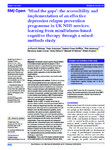‘Mind the gaps’: the accessibility and implementation of an effective depression relapse prevention programme in UK NHS services: learning from mindfulness-based cognitive therapy through a mixed-methods study
| dc.contributor.author | Rycroft-Malone, J | |
| dc.contributor.author | Gradinger, Felix | |
| dc.contributor.author | Owen Griffiths, H | |
| dc.contributor.author | Anderson, R | |
| dc.contributor.author | Crane, RS | |
| dc.contributor.author | Gibson, A | |
| dc.contributor.author | Mercer, SW | |
| dc.contributor.author | Kuyken, W | |
| dc.date.accessioned | 2019-10-22T14:00:49Z | |
| dc.date.available | 2019-10-22T14:00:49Z | |
| dc.date.issued | 2019-09-08 | |
| dc.identifier.issn | 2044-6055 | |
| dc.identifier.issn | 2044-6055 | |
| dc.identifier.other | ARTN e026244 | |
| dc.identifier.uri | http://hdl.handle.net/10026.1/15043 | |
| dc.description.abstract |
<jats:sec><jats:title>Objectives</jats:title><jats:p>Mindfulness-based cognitive therapy (MBCT) is an evidence-based approach for people at risk of depressive relapse to support their long-term recovery. However, despite its inclusion in guidelines, there is an ‘implementation cliff’. The study objective was to develop a better explanation of what facilitates MBCT implementation.</jats:p></jats:sec><jats:sec><jats:title>Setting</jats:title><jats:p>UK primary and secondary care mental health services.</jats:p></jats:sec><jats:sec><jats:title>Design, participants and methods</jats:title><jats:p>A national two-phase, multi-method qualitative study was conducted, which was conceptually underpinned by the Promoting Action on Research Implementation in Health Services framework. Phase I involved interviews with stakeholders from 40 service providers about current provision of MBCT. Phase II involved 10 purposively sampled case studies to obtain a more detailed understanding of MBCT implementation. Data were analysed using adapted framework analysis, refined through stakeholder consultation.</jats:p></jats:sec><jats:sec><jats:title>Results</jats:title><jats:p>Access to MBCT is variable across the UK services. Where available, services have adapted MBCT to fit their context by integrating it into their care pathways. Evidence was often important to implementation but took different forms: the NICE depression guideline, audits, evaluations, first person accounts, experiential taster sessions and pilots. These were used to build a platform from which to develop MBCT services. The most important aspect of facilitation was the central role of the MBCT implementers. These were generally self-designated individuals who ‘championed’ grass-roots implementation. Our explanatory framework mapped out a prototypical implementation journey, often over many years with a balance of bottom-up and top-down factors influencing the fit of MBCT into service pathways. ‘Pivot points’ in the implementation journey provided windows of either challenge or opportunity.</jats:p></jats:sec><jats:sec><jats:title>Conclusions</jats:title><jats:p>This is one of the largest systematic studies of the implementation of a psychological therapy. While access to MBCT across the UK is improving, it remains patchy. The resultant explanatory framework about MBCT implementation provides a heuristic that informed an implementation resource.</jats:p></jats:sec> | |
| dc.format.extent | e026244-e026244 | |
| dc.format.medium | Electronic | |
| dc.language | en | |
| dc.language.iso | en | |
| dc.publisher | BMJ | |
| dc.subject | implementation | |
| dc.subject | implementation science | |
| dc.subject | psychological therapy | |
| dc.subject | mindfulness | |
| dc.subject | mindfulness-based cognitive therapy | |
| dc.subject | depression | |
| dc.subject | PARIHS | |
| dc.title | ‘Mind the gaps’: the accessibility and implementation of an effective depression relapse prevention programme in UK NHS services: learning from mindfulness-based cognitive therapy through a mixed-methods study | |
| dc.type | journal-article | |
| dc.type | Journal Article | |
| dc.type | Research Support, Non-U.S. Gov't | |
| plymouth.author-url | https://www.webofscience.com/api/gateway?GWVersion=2&SrcApp=PARTNER_APP&SrcAuth=LinksAMR&KeyUT=WOS:000497787600039&DestLinkType=FullRecord&DestApp=ALL_WOS&UsrCustomerID=11bb513d99f797142bcfeffcc58ea008 | |
| plymouth.issue | 9 | |
| plymouth.volume | 9 | |
| plymouth.publication-status | Published | |
| plymouth.journal | BMJ Open | |
| dc.identifier.doi | 10.1136/bmjopen-2018-026244 | |
| plymouth.organisational-group | /Plymouth | |
| plymouth.organisational-group | /Plymouth/Faculty of Health | |
| plymouth.organisational-group | /Plymouth/Faculty of Health/Peninsula Medical School | |
| plymouth.organisational-group | /Plymouth/REF 2021 Researchers by UoA | |
| plymouth.organisational-group | /Plymouth/REF 2021 Researchers by UoA/UoA20 Social Work and Social Policy | |
| plymouth.organisational-group | /Plymouth/Research Groups | |
| plymouth.organisational-group | /Plymouth/Research Groups/FoH - Community and Primary Care | |
| plymouth.organisational-group | /Plymouth/Research Groups/Institute of Health and Community | |
| plymouth.organisational-group | /Plymouth/Users by role | |
| plymouth.organisational-group | /Plymouth/Users by role/Academics | |
| dc.publisher.place | England | |
| dcterms.dateAccepted | 2019-06-03 | |
| dc.rights.embargodate | 2019-12-3 | |
| dc.identifier.eissn | 2044-6055 | |
| dc.rights.embargoperiod | Not known | |
| rioxxterms.versionofrecord | 10.1136/bmjopen-2018-026244 | |
| rioxxterms.licenseref.uri | http://www.rioxx.net/licenses/all-rights-reserved | |
| rioxxterms.licenseref.startdate | 2019-09-08 | |
| rioxxterms.type | Journal Article/Review |


